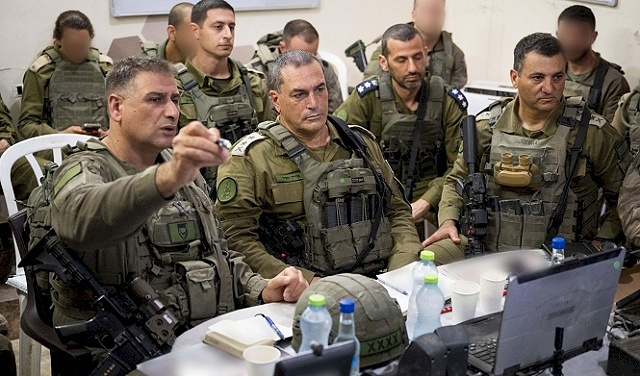
Israeli Security Chiefs Oppose the Gaza Occupation Plan and Warn of Its Consequences
SadaNews - Yedioth Ahronoth reported that all Israeli security chiefs rejected the plan to occupy the Gaza Strip during a Security Cabinet meeting yesterday, while The Wall Street Journal confirmed that the plan faces several challenges.
The newspaper indicated that the security council meeting lasted 10 hours and featured intense discussions in which the security leaders expressed their opposition to the occupation of Gaza to varying degrees, asserting that there are "more suitable options" to achieve the same goals.
It confirmed that the meeting was a stage for disputes between Prime Minister Benjamin Netanyahu and Chief of Staff Eyal Zamir, with some ministers also confronting Zamir over his position.
Israeli reports mentioned that Zamir described the Gaza occupation plan as a "strategic trap," asserting that it would exhaust the army for years and endanger the lives of the hostages.
According to Yedioth Ahronoth, National Security Council head Tzachi Hanegbi said during yesterday's meeting that recently published images of Israeli hostages showing signs of emaciation and suffering from hunger do not allow him to support the "all or nothing" plan, adding, "I am not willing to give up the chance to save at least 10 hostages... a ceasefire will enable us to attempt to reach an agreement regarding them."
Meanwhile, The Wall Street Journal quoted Israeli officials saying that workforce shortages are among the main constraints facing Israel in controlling Gaza, noting that retired Brigadier General Amir Avivi believes that rapid advancement would require several military units comprising tens of thousands of soldiers, which led him to prefer choosing a more gradual operation to reduce pressure on manpower.
It also explained that reserve soldiers in the Israeli army threatened not to return to fight in Gaza if they were called up again, amid a state of fatigue and exhaustion experienced by the occupation army due to the prolonged duration of the war.
The Fate of the Hostages
For its part, The New York Times quoted Israeli officials saying that the government's decision to escalate the war in Gaza raises concerns within the military because it may endanger the lives of Israeli hostages in Gaza.
The newspaper quoted retired Israeli General Gadi Shamni stating that the plan to control Gaza will not return the Israeli hostages and will not defeat Hamas or force it to relinquish its weapons, saying it has become abundantly clear that military pressure will not only fail to return the hostages but will also kill them.
He added that the plan to control Gaza will exacerbate the suffering of families, harm Israel's standing in the world, undermine the Israeli economy, and deepen the crisis of trust between the Israeli government and the military.
He affirmed that it will take years before the Israeli army can establish an effective military administration and weaken Hamas in Gaza.
According to the plan approved by the Israeli Security Cabinet, the army "is preparing to control the heavily devastated city of Gaza" in the northern Gaza Strip "with the distribution of humanitarian aid to the civilian population outside combat areas," as announced by Netanyahu's office yesterday.
In addition to disarming Hamas and "returning all hostages - alive and dead," the plan - according to Netanyahu's office - aims to impose "Israeli security control over the Gaza Strip and establish an alternative civilian administration that is not affiliated with Hamas or the Palestinian Authority."
The Israeli army occupies or conducts ground operations in about 75% of the area of Gaza, leading most of its operations from fixed positions in the strip or from its sites along the border.

The Cabinet Approves a Market Regulation Plan and Strengthens Oversight Measures in Prepar...

Resumption of University Tuition Coverage for Children of Employees in Governmental and Se...

Presidency: We condemn the occupation's plans to legitimize colonial farms

Report: 1,872 Attacks Carried Out by the Occupation and Its Settlers Last January

The First Days of Rafah Crossing Work.. Only 12 Palestinians Returned to Gaza Amid Tight R...

Poll: 53% of Israelis Believe It’s Time to End Netanyahu's Political Career

Occupation forces demolish a house and a cave in the town of Beit Ummar north of Hebron

